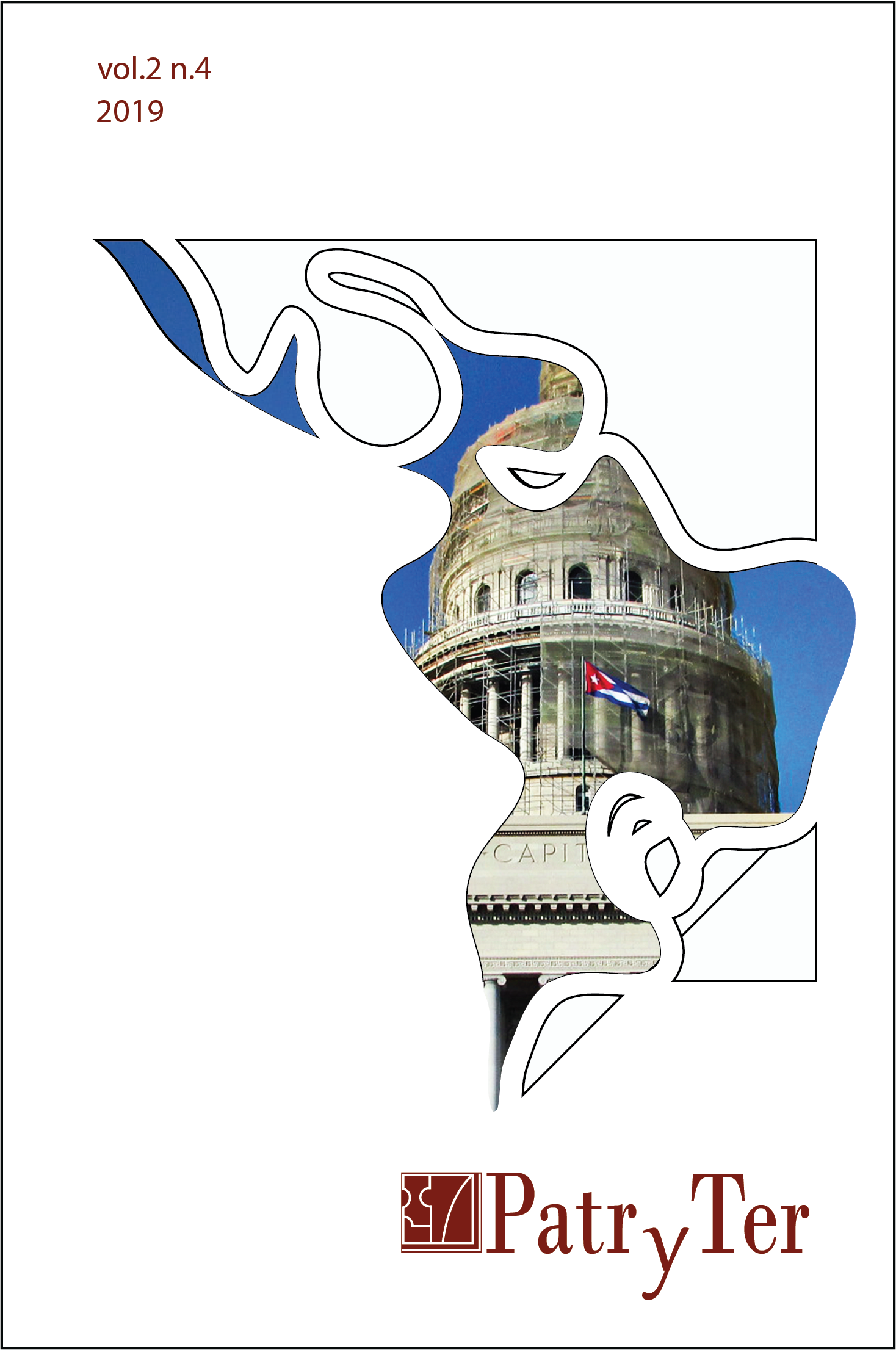Cities, countryside, heritage and territory in Latin America and the Caribean
Journals Arcada (Cuba) and PatryTer (Brasil)
DOI:
https://doi.org/10.26512/patryter.v2i4.25673Keywords:
scientific journal. heritage conservation. scientific community. Arcada. PatryTer. Latin AmericaAbstract
Advances in the field of heritage depends on a diffusion of the production of knowledge in different temporal and spatial contexts, expanding and democratizing the theories and practices resulting from strategic research and activities in this thematic field. As world heritage territories, Camaguey, north of Cuba, and Brasilia, the capital of Brazil, are home to two of the most important Latin American magazines: Arcada and PatryTer respectively. This article aims to evidence the systematic work of both journals in relation to the different perspectives of studies. Therefore, it adopts methodologically an analytical-descriptive approach to each journal's trajectory, pointing to as a result the excellence and diversity that Latin American intellectuals, study centers and research groups present for heritage researchs.
Downloads
References
Abreu, M. de A. (1998). Sobre a memória das cidades. In: Anais do V Seminário de História da Cidade e do Urbanismo. Campinas: Unicamp (CD-ROM), 1998.
Arcada. (2013-2019). Archivos de Arcada. Camagüey, Camagüey, Cuba: s/e.
CECONS. (1999-2014). Archivos del CECONS. Camagüey, Cuba: s/e.
Cento, E. (2007). La ¿polémica? de la fundación: reflexiones desde la historiografía. En E. Cento, Cuadernos de historia principeña 6. (pág. 9). Camagüey: Ácana.
Cento, E. (2013). Santa María del Puerto del Príncipe ante su medio milenio. Reflexiones sobre su nacimiento. En Cuadernos de historia principeña 12. Camagüey: Ácana.
ClustrMaps (2019). Visitor Map for Periodicos. Disponível em:https://clustrmaps.com/site/1a5px. Acesso em: mar. 2019.
Costa, E. B, & Alvarado-Sizzo, I. (2018). A filosofia de uma revista latinoamericana e caribenha sobre urbanização e patrimonialização. PatryTer, 1(1). https://doi.org/10.26512/patryter.v1i1.7203
Costa, E. B. (2018). Proyecto Politico-Academico de la PatryTer - Revista Latinoamericana y Caribeña de Geografía y Humanidades. PatryTer, 1(2). https://doi.org/10.26512/patryter.v1i2.12298
Costa, E. B. (2011). Totalidade urbana e totalidade-mundo. As cidades coloniaisbarrocas face à patrimonialização global. Tese de Doutorado. São Paulo: USP.
Costa, E. B. (2016) Utopismos patrimoniais pela América Latina, resistências à colonialidadedo poder. In: XIV Coloquio Internacional de Geocrítica: Las utopías y la construcción de lasociedad del futuro. Barcelona, 2016. Disponível em: http://www.ub.edu/geocrit/xiv_everaldocosta.pdf.
Gómez, L. (2009). El Centro Histórico de Camagüey, Patrimonio Cultural de la Humanidad. En E. Cento, Cuadernos de historia principeña 8 (págs. 11-23). Camagüey: Ácana.
Gómez, L. (2013). Camagüey, urbanismo y arquitectura. En O. G. Luis Álvarez, La Luz
Harvey, D. (2013). Espaços de esperança. 6ª. ed. Trad. Adail U. Sobral e Maria S. Gonçalves. São Paulo: Loyola.
Jeudy, H. (2005). Espelhos das cidades. Trad. Rejane Janowitzer. Rio de Janeiro: Casada Palavra.
Martins. J. S. (1992). Subúrbio. Vida cotidiana e história no subúrbio da cidade São Paulo. SãoPaulo: Hucitec; Prefeitura de São Caetano do Sul.
Massey, D. B. (2009). Pelo espaço: uma nova política da espacialidade. Rio de janeiro:Bertrand Brasil.
Oliveira, R. F. (2016). De aldeamento jesuítico a periferia metropolitana: Carapicuíba/SP como rugosidade patrimonial. Tese (Doutorado em Geografia). Brasília: GEA/UNB.
Ribeiro, A. C. T.(2006). Apresentação. In: Sposito, Eliseu S.; Sposito, M. E. B. (orgs.). Cidades médias: produção do espaço urbanoregional. São Paulo: ExpressãoPopular.
Santos, B. S. (2001). Um discurso sobre as ciências. EdiçõesAfrontamento: Porto.
Santos, M. (2004). Por uma geografia nova: da crítica da geografia a uma geografia crítica. 6. ed. São Paulo: Edusp.
Downloads
Published
How to Cite
Issue
Section
License
Copyright (c) 2019 PatryTer

This work is licensed under a Creative Commons Attribution-NonCommercial-NoDerivatives 4.0 International License.
Please be advised that Revista Patryter is licensed under a Creative Commons Attribution-NonCommercial-NoDerivatives 4.0 International License (CC BY-NC-ND 4.0) https://creativecommons.org/licenses/by-nc-nd/4.0/deed.en
Authors who publish in the PatryTer Magazine agree to the following terms:
- Authors retain the copyright and grant the journal the right of first publication, the work being simultaneously licensed under the Creative Commons Attribution-NonCommercial-NoDerivatives 4.0 International License (CC BY-NC-ND 4.0) which allows the sharing of the work with recognition of the authorship of the work and initial publication in this journal.
- The contribution is original and unpublished and is not being evaluated for publication by another journal. When submitting the article, authors should attach as a supplementary document a Letter addressed to the PatryTer's Editor, indicating the academic merits of the submitted work (relevance, originality and origin of the article, that is, from what type of research]. This letter must be signed by all authors.
- The authors authorize PatryTer Journal to publish the article in public and private databases, in Brazil and abroad.
- Authors declare that they are fully responsible for the entire contents of the contribution that they submit to the Editorial Board of PatryTer Magazine.
- Authors declare that there is no conflict of interest that could interfere in the impartiality of the scientific papers submitted to the PatryTer Magazine Editorial Board.
- Authors are authorized to take additional contracts separately, for non-exclusive distribution of the version of the work published in this journal (eg publish in institutional repository or as a book chapter), with acknowledgment of authorship and initial publication in this journal.
Authors are allowed and encouraged to publish and distribute their work online (eg in institutional repositories or on their personal page) at any point before or during the editorial process, as this can generate productive changes as well as increase the impact and the citation of the published work (See The Effect of Free Access).



